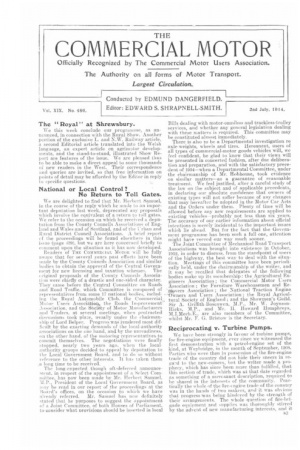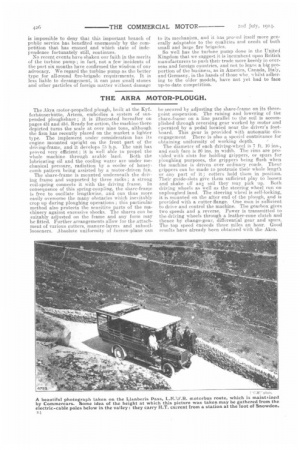The "Royal " at Shrewsbury.
Page 1

Page 2

If you've noticed an error in this article please click here to report it so we can fix it.
We this week conclude our programme, as announced, in connection with the Royal Show. Another portion of the exclusive L. and N.W. Railway article, a second Editorial articletranslated into the Welsh language, an expert article an agrimotor developments, and the stand-to-stand, illustrated Show Report. are features of the issue. We are pleased thus to be able to make a direct appeal to some thousands of new readers in the West. Their correspondence and queries are invited, so that free information on points of detail may be afforded by the Editor in reply to specific questions.
National or Local Control ?
No Return to Toll Gates.
We are delighted to find that Mr. Herbert Samuel, in the course of the reply which he made to an important deputation last week, deprecated any proposals which involve the equivalent of a return to toll gates. We refer to the occasion on which he received a deputation from the County Councils Associations of England and Wales and of Scotland, and of the Urban and Rural District Council Associations. A brief report of the proceedings will be found elsewhere in this issue (page 439), but we are here concerned briefly to comment upon the situation as it has now developed. Readers of THE COMMERCIAL MOTOR will be fully aware that for several years past efforts have been made by the County Councils Association and similar bodies to obtain the approval of the Central Goveriiment for new licensing and taxation schemes. The. original proposals of the County Councils Association were chiefly of a drastic and one-sided character. They came before the. Central Committee on Roads and Road Traffic, which Committee is composed. of representatives from some 17 national bodies, includ ing the Royal Automobile Club, the Commercial_ Motor -Users Associa,isp the Roads Tmprovement _Association, and the Sticiky of Motor Manufacturers and Traders, at several meetings, when protracted diseussions took place, usually under the chairmanship of Lord Belper_ Progress was Fendered most difficult by the exacting demands of the local-authority associations on the .one hand, and. by the unreadiness, on the other hand, of the motoring representatives to commit themselves. The negotiations were finally .topped, nearly two years ago, when the localauthority groups decided to appeal by deputation to the Local Government Board, and to do so without reference to the other interests. Tt has taken them ;a long time to be. received.
The long-expected _ though oft-deferred announcement, in respect of the appointment of a Select Commil tee. has now been made by Mr. Herbert Samuel, 1LP., President of the Local Government: Board, as may be read in our report of the proceedings at the 'Board's offices, on the occasion to which we have already referred. Mr. Samuel has 'now definitely stated that he purposes to suggest the appointment of a Joint Committee, of both Houses of Parliament. to consider what Provisions should be inserted in local Bills dealing with motor-omnibus and trackless-trolley services, and whether any general legislation dealing with these matters is required. This committee may he constituted almost immediately.
There is also to be a Departmental investigation re axle-weights; wheels and tires. Hereanent, users of all types of commercial-motor goods vehicles will, we feel confident, be glad to know that their views will be presented in concerted fashion, after due deliberation and preparation, and with the satisfactory precedent of 1904—when a Departmental Committee, under the chairmanship of Mr. Hohhouse, took evidence on similar matters—as a guarantee of reasonable treatment. We feel justified, after a. careful study of the law on the subject and of applicable precedents, in declaring our absolute confidence that owners of existing types will not suffer because of any changes that may hereafter be adopted in the Motor Car Acts and the Orders under them. Plenty of time will be allowed before any new requirements are applied to existing vehicles—probably not less than six years. The accuracy of our earlier information about official intentions is merely incidental to the important issues which lie ahead. But for the fact that the Government programme has been such a full one, attention might have veered our way much sooner. The Joint Committee of Mechanical Road Transport Associations was brought into existence in October, 1912, in order to discuss, from the standpoint of users of the highway, the best way to deal with the situation. Meetings of this committee have been periodically held, under the chairmanship of the writer, and it may be recalled that delegates of the following bodies make up its membership : the Agricultural Engineers Association ; tile Commercial Motor Users Association ; the Furniture Warehousemen and Re
vers Association ; the National Traction Engine Owners and -Users Association ; the Royal Agricultural Society of England ; and the Showmen's Child. Sir A. Griffith-Boseawen, M.P., Mr. W. JoynsonHicks, M.P., and Mr. H. Howard Humphreys, M.I.Mech.E., are also members of the Committee, whilst Mr. F. G. Bristow is the Secretary.
Reciprocating v. Turbine Pumps.
We have been strongly in favour of turbine pumps, for fire-engine equipment, ever since we witnessed the first demonstration with a petrol-engine set of the kind, at Weyhridge, in the month of September, 1908. Parties who were then in possession of the fire-engine trade of the country did not hide their sneers in rega-xl to the new-corners, but the writer made a prophecy, which has since been more than fulfilled, that this section of trade, which was at that date rega.rded as something of a sacresa.net description, required to be shared in the interests of the community. Practically the whole of the fire-engine trade of the country was in the hands of two makers, and it was obvious that progress vas being hindered by the. strength of their arrangements. The whole. question of fire-brigade equipment and supplies was thoroughly stirred by the advent of new manufacturing interests, and it
is impossible to deny that this important branch of public service has benefited enormously by the competition that has ensued and which state of independence fortunately still, continues.
No recent events have shaken our faith in the merits of the turbine pump ; in fact, not a few incidents of the past six months have confirmed the wisdom of our advocacy. We regard the turbine pump as the better type for all-round fire-brigade requirements. It is less liable to derangement, it can pass small stones and other particles of foreign matter without damage to its mechanism, and it has proved itself more generally adaptable to the qualities, and needs of both small and large fire brigades. So well has the turbine pump done in the United Kingdom that we suggest it is incumbent upon British manufacturers to push their trade more keenly in overseas and foreign countries, and not to leave a big proportion of the business, as in America, Canada, Italy, and Germany, in the hands of those who, whilst adhering to the older models, have not yet had to face up-to-date competition.


































